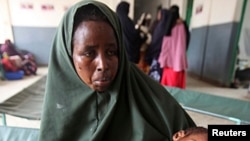A drought that has gripped the Horn of Africa for almost two years shows no sign of relief, threatening the people of Ethiopia, Kenya and Somalia with a humanitarian disaster. Hundreds of thousands have been displaced from their homes in search of food and water, and the specter of mass starvation has prompted nations and organizations in the region and beyond to mobilize to help.
The United States is alarmed at the situation and is working with partner governments and the international community to address the suffering. Although relief is arriving, the crisis is widespread and malnutrition has grown well beyond emergency levels. The human toll could soar if the rains don't come soon.
So far this year, the United States has provided more than $366 million in emergency aid to countries in the Horn. Some 19,000 metric tons of this food is positioned in the region and is now moving out to those in need in Somalia.
In Somalia, the situation has become so dire that even the terrorist group al Shabaab has indicated the possibility of permitting delivery of humanitarian assistance to Somalis in need. Al-Shabaab previously ejected international humanitarian assistance to south and central Somalia by threatening the safety of workers and diverting food aid for their own use. It must demonstrate good faith in granting unconditional access to international humanitarian workers if their announcement is to be believed.
The humanitarian crisis in the Horn of Africa requires a broad international response. The United States is mobilizing resources now and calls on other nations and international bodies to cooperate to avoid the kind of humanitarian disaster seen in the region when drought struck twenty years ago, claiming more than 300,000 lives.
Confronting East Africa's Drought

The United States is alarmed at the situation and is working with partner governments and the international community to address the suffering.



